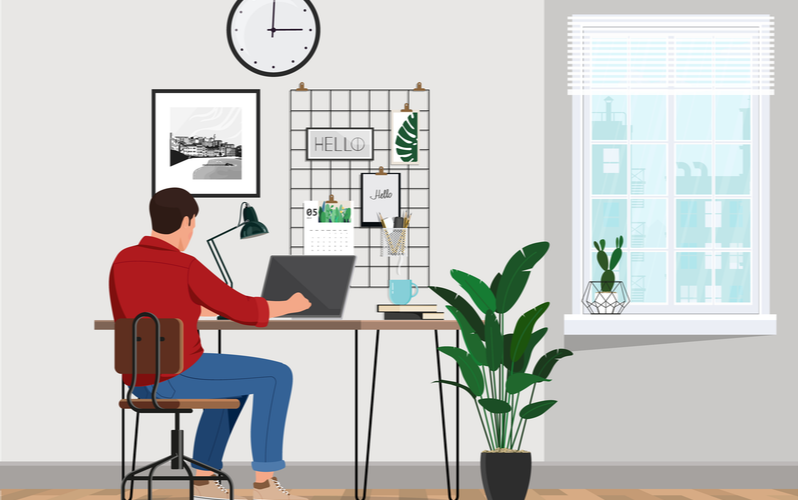Working from home is a new experience for many people. If you are similar to me, the house has many distractions that limit your productivity. I am a neuropsychology student and researcher on the topic of executive functioning – your brain’s ability to engage in attention, planning, impulse control, decision-making, and thinking flexibility.
I believe the recommendations I provide to my patients will also be helpful to you in this time. The following strategies will help you maximize productivity while working from home.
Note: I recognize I do not have the added factor of caretaking for children. Parents, you are heroes. Please take what is helpful from this and ignore what isn’t. No one can apply these concepts perfectly (especially me), but maybe one or two will make a huge difference.
1. Think of Your Attentional Abilities as a Ruler.
As the day goes on without a rest period, you lose inch after inch until you are staring at a computer screen and forget what day and time it is. Working from home has so many distractions that you are doing the same job, but with less of your ruler. To increase your ruler, it is important to replenish your mental energy.
2. Give Yourself Self-Compassion and Plan it Into Your Life.
I recommend you plan for one and a half the typical time to complete projects due to the amount of potentially distracting things around you. Working with new limitations is frustrating, so be gentle with yourself [1].
3. Create a Productivity Space That Is Reserved Only for Work and Is Not in Your Bed.
It is crucial to create an intentional space for work, and a space to leave when it is time to play. Working in your bed can also make it harder to get restful sleep in that bed [2].
4. Create Visual Lists and Reminders for Tasks.
If you have a whiteboard, put it in your bathroom, kitchen, in front of your TV, or wherever you will pass it frequently. If not, use sticky notes, tape paper to the wall, or write on your hand. Do whatever is necessary to “run into” your reminders frequently. Also consider setting phone alarm reminders [3].
5. Commit to Restful Sleep.
Sleep during stressful times is crucial to attention and performance during the day. Set a dedicated bedtime, limit screens for two hours before bed, and watch movies and shows outside of your bedroom. Limit caffeine and alcohol. If you have difficulty falling asleep for more than 30 minutes, get up, leave the room, and read a (paper) book until you feel sleepy again. If you have racing thoughts, put a notepad beside your bed and dump all your thoughts onto the page until you run out [4].
6. Break up Large Projects Into Small Ones.
I use a metaphor that our productivity tasks are like pieces from a game of dominoes. Instead of connecting pieces towards completing the game, my mind will begin organizing all the pieces on a table and try to strategize a perfect first move until I am overwhelmed with the sheer number of tiles.
Sometimes, I start stacking them into a tower in my mind like Jenga. Holding a large number of tasks in your mind spends your mental energy. Instead, focus on two to three tasks at a time, and try accomplishing them without overthinking [4].
7. Producing and Editing Should Never Happen at the Same Time.
You can always edit later. The important thing is getting your first drafts done and returning to them when you have some distance from it. The goal is to produce the content before editing the content.
If your work is going out to others, consider asking a trusted colleague or friend for proofreading help. I also use grammarly.com and find it incredibly useful for catching grammatical nuances [4].
8. Achieve the Smallest Goals First.
Start by completing tasks that take the least amount of time and energy before moving on to the more significant tasks. Completing a task reinforces the idea that tasks can be completed and provides motivation to complete the next one [4].
9. Give Yourself a Short Time Limit. Use a Timer With an Alarm.
Ten to 15 minutes is my productivity window for pure attention. If that seems daunting, pick a timeframe that works for you and commit to it. Compete with yourself to see how much you can achieve in your timeline, and rest when the deadline ends. Rest for five minutes and then return to the next task [3].
10. Reward Yourself When You Cross Something off the List.
You are at home now, so dance parties are acceptable [3].
11. Physical Activity Helps Replenish Your Mental Energy.
Consider doing dances, stretches, push-ups, sit-ups, running in place, jumping rope, or doing yoga. Do whatever you are able and do small bits throughout the day [5].
I hope these tips find you well as we adjust to our new limitations. Please be gentle with yourself and others. We are in this together.
References
1. Neff, K. (n.d.). Why self-compassion trumps self-esteem. Retrieved April 6, 2020, from https://greatergood.berkeley.edu/article/item/try_selfcompassion.
[2] CDC. Tips for Better Sleep. (2016, July 15). Retrieved April 6, 2020, from https://www.cdc.gov/sleep/about_sleep/sleep_hygiene.html
[3] Attention deficit hyperactivity disorder (ADHD) treatment & management: Approach considerations, medical care, diet. (2020, March 26). Retrieved April 6, 2020, from https://emedicine.medscape.com/article/289350-treatment#d5
[4] Mind Tools Content Team. (n.d.). Personal goal setting: Planning to live your life your way. Retrieved April 6, 2020, from https://www.mindtools.com/page6.html
[5] Want to flex your aging brain? Do aerobic exercise and resistance training. (2017, May 16). Retrieved April 6, 2020, from https://www.semel.ucla.edu/longevity/news/want-flex-your-aging-brain-do-aerobic-exercise-and-resistance-training.
- Navigating Negative Feedback: What I Learned as a Peer Supervisor - July 29, 2020
- 11 Strategies to Maximize Productivity While Working From Home - April 22, 2020

